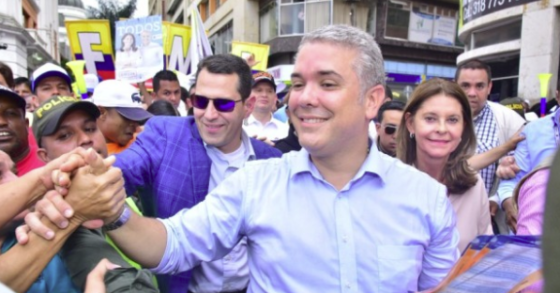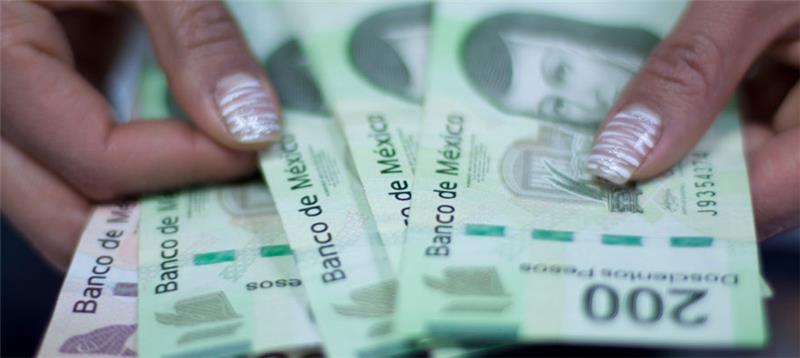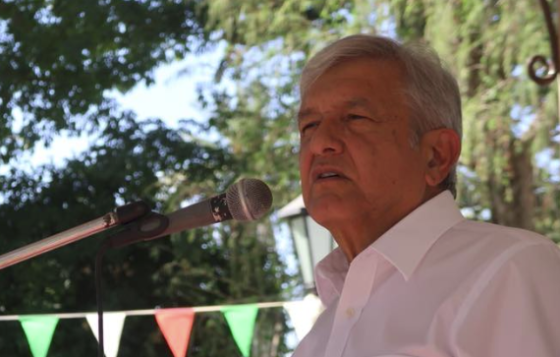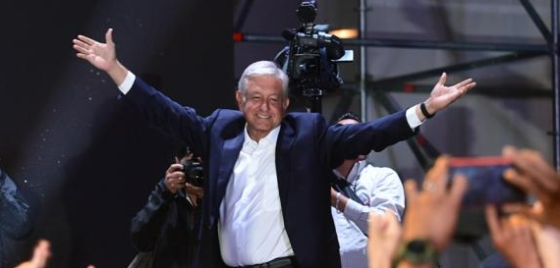
Will Colombia’s New President Deliver on His Promises?
Iván Duque, a conservative former senator, on Sunday won Colombia’s presidential runoff election. What does it mean for the country?
A Daily Publication of The Dialogue
The U.N. Economic Commission for Latin America and the Caribbean, or ECLAC, in a report published in May proposed that governments in the region ensure immediate temporary cash transfers to the most vulnerable in response to the economic fallout of the Covid-19 pandemic, suggesting such transfers be made permanent in the long term as a step toward a universal basic income, or UBI. Will such a cash transfer policy successfully lift people out of poverty, and what unintended consequences might it have in the region? What would a UBI system look like in Latin America and the Caribbean? Is there political will among countries in the region to carry out such programs, and do governments have the ability to implement them effectively as they face the worst global recession in decades?
Claudio M. Loser, visiting senior fellow at the Inter-American Dialogue, president of Centennial Group Latin America and former head of the Western Hemisphere Department of the International Monetary Fund: The key issue is the distinction between the need to help the most vulnerable and the idea of a general universal basic income. Latin America has regionwide experience with respect to mechanisms to help the poorest or more vulnerable sectors of the population that proved to be effective and financeable. The idea of a universal basic income has been applied to relatively small samples of people—Finland and other European countries—or for limited amounts as supplementary income, with controversial degrees of success. The costs of one and the other are quite different. On a back-of-the-envelope basis, if 10 percent of the population of Latin America (roughly the number in extreme poverty, according to ECLAC) were to receive an annual transfer equivalent to 10 percent of per capita income, the cost would be about 1 percent of GDP. It could be somewhat higher if there is graduated support for people slightly above the extreme poverty line. This could eliminate extreme poverty and reduce poverty levels at a reasonable cost. If the idea is to provide the entire population with a minimum income equivalent to only 15 percent of average income through universal transfers, the cost would be 15 percent of GDP, based on a massive increase in taxation. The required effectiveness of the measure and the ability of governments to implement it are enormous. Unfortunately, so would be the social consequences in terms of incentives to work and to pay taxes—the latter a serious weakness in the region.”
Mac Margolis, Bloomberg Opinion columnist: “The economic devastation wrought by the coronavirus pandemic has triggered a long overdue policy debate about how to protect the most vulnerable in society. Universal basic income is not the way to go. Yes, paying everyone a minimum wage sounds great: it might eliminate red tape and the vexing task of identifying and vetting deserving households. Yet a universal handout, including to those who don’t need it, gets the Latin America equity agenda backward. Implementing UBI would take foundational reforms, including overhauling taxes, pensions and targeted welfare. Thanks to entrenched interests bent on preserving the regressive status quo, however, that bold agenda has long eluded developing nations. Perhaps that’s why so few countries have basic income programs, none of them in Latin America. Besides, Latin America already has a proven system for helping those who need it most: conditional cash transfers benefit some 127 million low-income people in 20 Latin American countries, aiding families who keep their children in school and vaccinated. Beneficiaries are selected through transparent rules and eligibility specs, not the whim of welfare gatekeepers. The direct payments, often through cash cards, leapfrog wasteful bureaucracy. Brazil spends 0.5 percent of gross domestic product on its targeted Bolsa Família benefit. UBI could cost 22 times more, Getúlio Vargas Foundation economist Marcelo Neri concludes. ‘That’s helicopter money,’ he said. Cash transfers are not flawless. Millions of self-employed and informal sector workers have slipped through the cracks during the pandemic. Yet the exclusions are an argument for improving targeted poverty relief, not scrapping it, never mind dropping money from the sky.”
Nora Lustig, professor of Latin American economics at Tulane University and nonresident fellow at the Center for Development and the Inter-American Dialogue: “As a response to the pandemic, countries are expanding cash transfer programs to protect those hurt by the coronavirus’ economic fallout. Whether to convert this into a permanent change is a different matter. A UBI can provide a broad-based safety net in the face of a reduction in income (such as during the current pandemic). However, if the main objective is poverty reduction, replacing existing targeted programs by a UBI would leave the poor worse off. If the aim is to both reduce poverty and create a social protection floor, a UBI should be high enough, at the minimum, for the poor to be no worse off than under current programs. Achieving this in a budget-neutral manner will require an increase in taxation, which may create work disincentives and political resistance from the middle classes. Thus, there is a tradeoff between efficiency and the size of the universal basic income floor. The higher the floor, the larger the potential losses in efficiency due to higher taxes. But, the lower the floor, the smaller the ability of a UBI to act as a genuine safety net. In the end, whether to introduce a UBI will depend on the country. What cannot wait is implementing a universal registry that includes informal workers and the self-employed. In the absence of such a registry, expanding the coverage of transfers quickly enough is difficult. A second matter that cannot wait is to keep track of spending on cash transfers. Accurate information is not available. ECLAC discontinued reporting this data some time ago.”
Paul R. Katz, vice president for special projects at the Jain Family Institute: “Throughout the Americas, the inadequacy of existing social protections has been cast into relief by Covid-19. In Latin America, where approximately half of all workers are employed in the informal sector, the tendency to tie social benefits to formal employment presents an especially acute problem. The value of unconditional benefits could hardly be clearer. Governments across Latin America responded to the crisis by instituting or bolstering targeted temporary cash transfer programs. In Brazil, these initiatives include an emergency federal benefit for tens of millions of unemployed and self-employed workers, as well as municipal projects in Niterói and Maricá. (The latter is home to the largest permanent basic income program in Latin America, which the Jain Family Institute has partnered with the Universidade Federal Fluminense to study.) If the academic literature is any guide, these programs are likely to improve the lives of their beneficiaries. As my colleagues Sidhya Balakrishnan, Sara Constantino and Stephen Nuñez argue in a forthcoming paper, studies and experiments across the world have shown positive impacts on health, educational attainment and crime. Nonetheless, many questions remain, especially regarding opportunity costs and general-equilibrium effects. As with all redistributive social policy, the question of political feasibility is paramount. On this count, Brazil’s recent experience offers important new insights. The coalition of social movements responsible for Brazil’s national emergency basic income is one of the broadest in the country’s history. As Leandro Ferreira, the president of the Brazilian Basic Income Network, recently argued, the rapid success of this initiative has placed a permanent cash transfer program at the center of Brazilian political debate. Yet broadscale benefits bring new challenges, particularly around disbursement. While Brazil’s unified database for social benefits, the Cadastro Único, has offered an invaluable point of departure, getting cash to unregistered individuals has required creativity and sustained effort in the face of presidential intransigence. Temporary partial basic income programs represent important steps toward the unification and fortification of existing social benefits. Advocates of a more durable safety net must not miss the opportunity that these initiatives afford, in Brazil and across Latin America.”
 The Latin America Advisor features Q&A from leaders in politics, economics, and finance every business day. It is available to members of the Dialogue’s Corporate Program and others by subscription.
The Latin America Advisor features Q&A from leaders in politics, economics, and finance every business day. It is available to members of the Dialogue’s Corporate Program and others by subscription.
Iván Duque, a conservative former senator, on Sunday won Colombia’s presidential runoff election. What does it mean for the country?
Mexicans go to the polls on Sunday, July 1, for the country’s presidential, legislative and local elections. What can we expect?
Leftist Andrés Manuel López Obrador swept to victory Sunday in Mexico. What changes are in store?
 The Covid-19 pandemic has spurred debate over whether countries should provide their citizens a universal basic income. // File Photo: Mexican Government.
The Covid-19 pandemic has spurred debate over whether countries should provide their citizens a universal basic income. // File Photo: Mexican Government.

